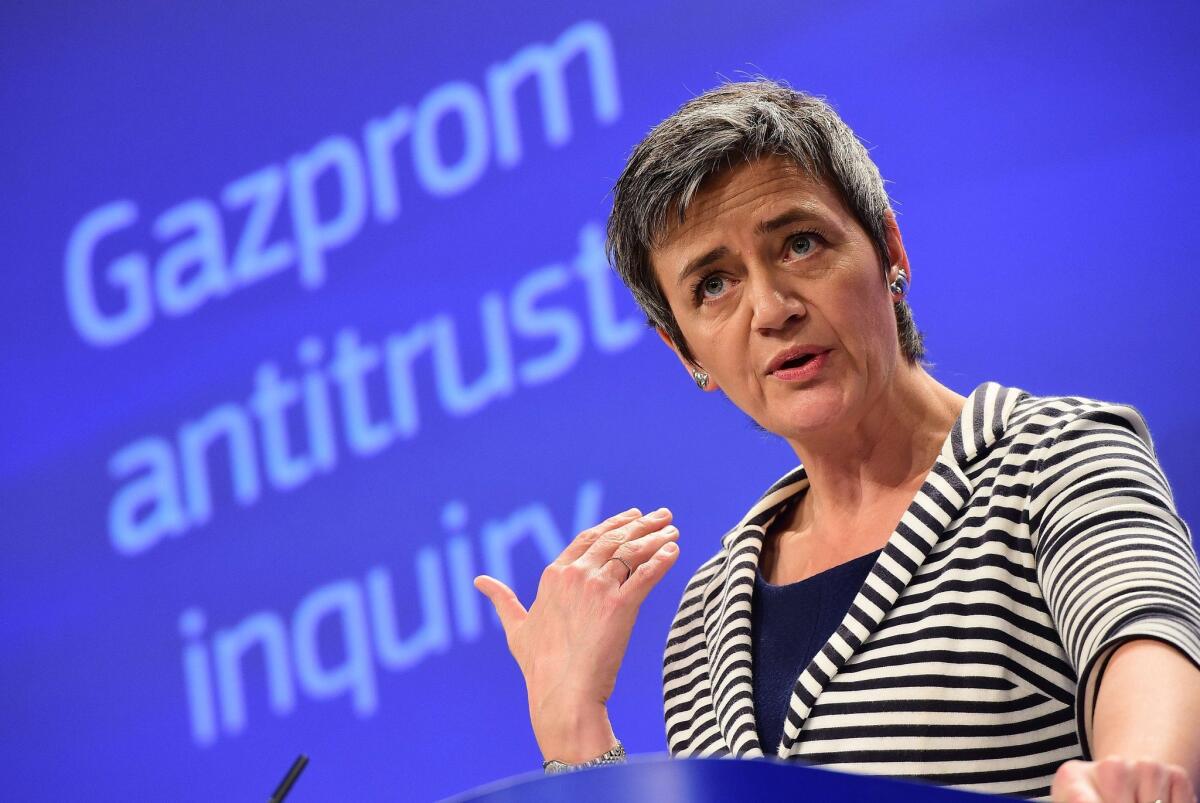European Commission accuses Russia’s Gazprom of unfair practices

- Share via
Reporting from Moscow — The European Commission has accused Russia’s Gazprom energy giant of abusing its dominant position in Central and Eastern European natural-gas markets in a move that threatens to add to already strained relations with Moscow.
Unveiling the preliminary results of an antitrust investigation Wednesday, the Brussels-based commissioners said Russia’s natural-gas monopoly was hindering competition in eight European Union member states -- Bulgaria, the Czech Republic, Estonia, Hungary, Latvia, Lithuania, Poland and Slovakia.
“All companies that operate in the European market, no matter if they are European or not, have to play by our EU rules,” said Margrethe Vestager, the commissioner responsible for competition policy.
Gazprom rejected the commission’s findings as “unfounded” and suggested that it had been unfairly singled out by European regulators.
In its statement, Gazprom said its business practices in European Union markets, including pricing formulas, were “in full conformity with the standards observed by other producers and exporters of natural gas.”
Gazprom accounts for about 30% of European Union states’ gas imports, but countries in Central and Eastern Europe that were once part of the Soviet-era Comecon trading bloc are disproportionately dependent on Russian gas because of their inherited distribution infrastructure.
European Union gas market regulators launched an investigation of Gazprom’s business practices after conducting antitrust raids on some of the energy behemoth’s European offices in 2011.
Unveiling the preliminary results of the inquiry, the commission complained that Gazprom had used its commanding position in the region to demand high prices and restrict its captive customers’ ability to secure supplies from other sources.
The commissioners’ objections focused on Gazprom’s use of so-called destination clauses in gas contracts that bar importing countries from selling supplies to other states. By blocking onward sales, Gazprom was able to demand higher prices from countries heavily dependent on direct gas supplies from Russia, the commission said.
Another concern was the Russian company’s practice of indexing gas prices to a basket of oil products that “unduly favored Gazprom over its customers,” the commissioners said.
Since the investigation was launched, energy trading relations between Russia and European Union states have been further strained by the crisis in Ukraine -- the nation serves as a conduit for more than half the gas Russia supplies to Europe. The Western economic bloc has imposed sanctions on Russia to punish its seizure and annexation of Ukraine’s Crimea region.
Ukraine was until recently Gazprom’s biggest foreign gas buyer but cut back Russian purchases amid escalating disputes over gas prices and transit terms.
The European Union has helped broker deals to keep Russian gas flowing to Ukraine in spite of the conflict between Kiev government forces and Russia-backed separatists in eastern Ukraine. But Gazprom has used destination clauses to block lower-priced resales to Ukraine.
Gazprom has 12 weeks to reply to the commission statement of objections and can also request a hearing to contest them. If the charges are upheld, the Russian company could face fines of up to 10% of its annual revenue, though few expect the Western economic bloc to demand the maximum penalty.
In a statement Wednesday, Gazprom said it was confident that an “acceptable solution” to the antitrust case could be achieved through negotiation.
Even before the Ukraine crisis, Gazprom was struggling to comply with the European Union’s policies aimed at infusing more competition into natural-gas and electricity markets in the 28-country bloc.
Gazprom particularly objects to the alliance’s demands that it share access with third parties to pipelines transporting gas exports to Europe. In December, Gazprom abruptly canceled the South Stream pipeline project that was designed to bring Russian gas to Europe across the Black Sea, bypassing Ukraine.
Instead, Gazprom plans to build a new pipeline across the Black Sea to Turkey and is demanding that European countries invest in transport infrastructure to carry supplies from there to the European continent.
Gazprom has pledged to cease shipping gas through Ukraine by 2020, a move that could leave Balkan countries without supplies unless alternative routes are developed.
Gorst is a special correspondent. Times staff writer Carol J. Williams in Los Angeles contributed to this report.
Follow @cjwilliamslat for the latest international news 24/7
More to Read
Sign up for Essential California
The most important California stories and recommendations in your inbox every morning.
You may occasionally receive promotional content from the Los Angeles Times.










